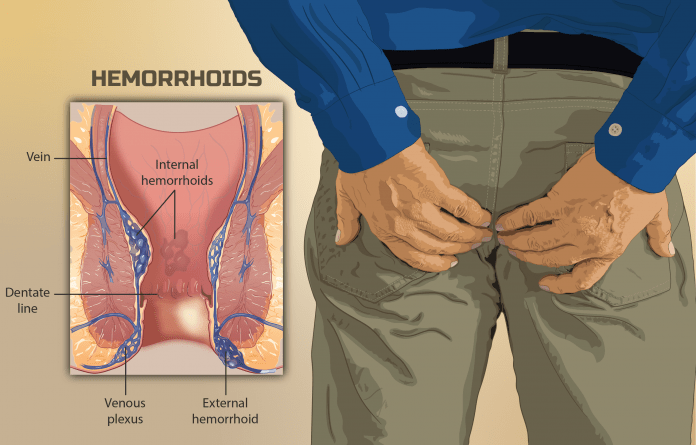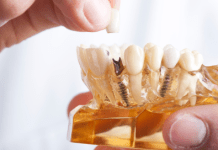Piles are also known as hemorrhoids. They are nothing but lumps that are found around the anus or in the rectum. These lumps have engorged and swollen blood vessels. There are many causes of piles and here we will discuss them in detail.
There are mainly two types of piles which are – Internal and external. In internal hemorrhoids, these lumps are found inside the anus and the starting portion of the rectum. In this case, the hemorrhoids are found in the dentate line. The dentate line is the defining line between the end of the anal canal and the rectum. They do not cause any pain, but they might lead to bleeding. In external piles, hemorrhoids are found in the opening of the anal. In many cases, it is found to be hanging out from the anus. These can cause extreme pain and are always below the dentate line.
Table of Contents
Causes of piles
The main cause behind piles is too much pressure on the blood vessels around the anus or in it. Any person suffering from long term constipation can be a victim of piles. When there is too much straining to pass the stool, the pressure affects the blood vessels present in the anal canal and rectum; this causes the inflammation and the swell. Here are other reasons that cause piles –
Long Term Constipation
Many people confuse piles with constipation. But, these two are completely different from each other. In constipation, there is hardly any bleeding. But, constipation can surely lead to piles. Due to the long period of sitting in the toilet and straining while suffering from constipation can lead to piles. The strain causes more hemorrhoids. The cause of long term constipation is the minimum amount of fiber in the diet.
Thus, doctors avoid not putting unnecessary strain on your bowel system.
Diarrhea
Yes, diarrhea, too, can cause piles. If you have been suffering from diarrhea for a prolonged time, it may lead to piles. When you are suffering from diarrhea, you will be visiting the toilet too many times. This can strain the lower rectum of your body; this prolonged straining the lower rectum can lead you to piles. It can cause irritation, a bit of discomfort, and swelling after suffering from a long period of diarrhea. These can be a prominent sign of piles. This is why it is advised that even while suffering from diarrhea, straining should be avoided.
Obesity
One of the common causes of piles is obesity. Rather piles are commonly found in obese people. It is known that excess fat put pressure on blood vessels. This affects the blood circulation in our bodies. The same thing happens in the veins and blood vessels found in and around the anus and colon of the obese individual. Sometimes, people who tend to have excess weight in their abdomens than the rest of their bodies are more prone to piles. This can lead to producing hemorrhoids in the anal canal or rectum.
Lifting heavyweights
If you are lifting weight on a daily basis, you might become prone to suffer from piles. When you pick up too much weight, you are straining or abdomens. This includes straining your blood vessels in and around your anus and rectum. If your lifting too much weight in your gym, you should be careful about a consequence like this. This is also seen in many laborers who lift too much weight. It is advised to be aware of such a consequence while committing to picking up too much weight.
Pregnancy
It can come to you as a shock, but pregnancy can be a reason for the occurrence of piles. Moreover, it is one of the common causes of piles. While you are carrying a baby in your pelvis, the blood vessels in the pelvis go through immense pressure. This many times leads to the expansion of the blood vessels of the rectum and anal Causing piles. But, as it happens naturally, there is not much way you can avoid this situation while carrying a baby. However, if you have developed piles while pregnant, it is likely to get cured after childbirth.
Sitting for a long time
If your job includes sitting at one place and position for too many hours at a stretch, it can lead you to piles. It is a very common problem with anyone working at an office, banks, etc. when you are sitting for too many hours; too much pressure is put in and around the vessels in your anal canal and rectum, gradually leading to piles. After all, the main reason behind piles’ occurrence is putting too much pressure in the lower part of your abdomen. To avoid such a situation, you need to take small breaks between your works. You also need to be aware of such a situation before you start to work.
The Age Factor
The more you grow old, the more prone you become to catch piles. Once you are over the age of 50, the risk factor to catch piles. As you start to grow old, the main cause behind this is the supporting tissues in and around your anus and rectum grow weak. This increases the chances for you to develop piles. This is why you would notice that older people, mostly above the age of 50, are more likely to catch piles than any other age group. Weak tissues in the rectum and anus can cause piles, and it can be painful and often lead to bleeding.
Familial Risk Factor
In many cases, it is seen that the problem of piles is inherited from the family members. In these cases, the individual does not inherit the disease in general, but they surely inherit weaker blood vessels that are one of the main reasons behind piles. The weaker your blood vessels are, the more prone you are to develop piles. When you have weak blood vessels, you become more prone to swelling and inflammation, gradually leading to piles.
Infection
Infection in the anal canal or the rectum can also lead to piles or hemorrhoids. If you have the infection in your anal canal or in the rectum, the blood vessels in and around that area start to weaken. This weak blood vessel in that area leads to piles. When you are suffering from any sort of infection in your lower abdomen, you tend to put more strain in that area, which will lead to piles. Any infection in the lower abdomen is advised to be treated by experts.
Liver Cirrhosis
Many times it is noticed that people who suffer from liver cirrhosis also tend to develop piles in the later stage. Liver cirrhosis causes the veins in the rectum to engorge and swell. This symptom is known as varicose veins. You may or may not suffer from constipation. But, it may lead to bleeding and other problems in your body. Also, in liver cirrhosis, too much fluid can get stored in the lower abdomen. This is known as Ascites. This can also make you prone to piles. There is too much possibility of catching piles if you are suffering from liver Cirrhosis. This disease may also lead to a swollen abdomen risking your chances of catching piles.
Chronic Cough
This may be puzzling, but chronic cough or coughing for too much time can lead you to piles. When you have excessive coughing, it puts too much pressure on your veins in and around your anus and rectum. This makes them prone to swelling, under such pressure and thus causing piles. When you have chronic coughing, you should be aware of such a situation. Piles can also be caused due to sneezing.
Anal Intercourse
Yes, you heard that right, having anal intercourse can higher your risk of causes of piles. This situation is mainly possible if you have hemorrhoids. The penetration in your anal is said to irritate the existing hemorrhoids. This will later lead to bleeding and weakness of the tissue in anus and rectum. The weakening of muscles of anus and rectum can lead to piles. However, you can become prone to piles if you are having anal intercourse for a prolonged period.
Surgeries
If you had surgery recently in the past, you are more likely to become prone to piles. But, this only includes the surgery of the anus or the rectum. This mainly occurs due because the muscles near the rectal and the anal area become weaker than before. If you keep on putting too much strain on it can lead to piles. This is why people are advised to go the toilet only when required, not sit for too much time at a stretch and not lift heavyweights. The first few months of the surgery is when you have to be extra cautious about your body.
Straining while passing stool
If you are straining too much while you are passing stool, it can be one of the causes of piles. Even if you do not have any of the problems mentioned above, disease, or habits, you can still catch piles if you strain your lower abdomen. The straining puts too much pressure on the veins of the anus and rectum, thus causing piles. You need to quit this habit right away. The better way would be to drink a lot of water or any other fluids such as juice, milk, etc. A prolonged period of training will lead to piles.
Low-fiber diet
This is one of the main reasons why many people suffer from piles. Their diet does not include enough fiber. Fiber helps our body to produce roughage. Roughage helps in the formation of our stool and helps us with a better bowel movement. It also helps our bodies to clean out everything. When you lack the fiber, you are also restricting a smooth way of bowel movement. Adding food that contains fiber can be a great idea. This can even help you avoid constipation and the problem of straining. By adding foods that have fiber, you also have to drink lots of water. Your stool becomes hard due to the lack of fiber and water.
Lack of water
The lack of drinking enough water can be one of the vital reasons for the causes of piles. When you are not drinking enough water, you are preventing your body from a better bowel movement. Water also helps our bodies make our stool less hard, so it becomes easy for us to excrete. When your stool is becoming hard, it becomes tough for you to pass it, and that is where we start straining. The straining affects the veins of our anus and rectum, thus causing piles. This is why you need to drink plenty of water to clean your system and better bowel movement.
How to treat piles?
The causes of piles can show up at any age in your body. But, it can become very dangerous if you do not treat it at the right time. If you have any discomfort in your lower abdomen, you must visit a doctor for a diagnosis. If you leave piles untreated for a prolonged period, you will have to face far more chronic diseases that can cause piles.
A doctor will help you through the examination to diagnose piles. As piles are a number of swollen and inflamed tissues, it can vary in size as well. These hemorrhoids scale from grade I to IV according to the condition. You might even require surgery if your hemorrhoids are at III to IV grade.
Doctors and experts have advised not to sit for long hours or lift heavy objects and strain while passing stool. You need to drink a lot of water and add foods with fiber components in your diet for a better bowel movement.


















